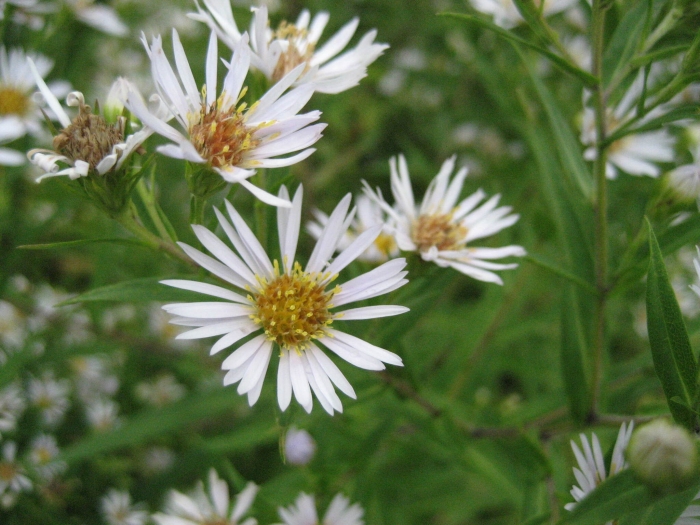Shining Aster
(Symphyotrichum firmum)
Shining Aster (Symphyotrichum firmum)
/
/

© rboles
CC BY 4.0
Image By:
© rboles
Recorded By:
Copyright:
CC BY 4.0
Copyright Notice:
Photo by: © rboles | License Type: CC BY 4.0 | License URL: http://creativecommons.org/licenses/by/4.0/ | Uploader: rboles | Publisher: iNaturalist |

























Estimated Native Range
Summary
Symphyotrichum firmum, commonly known as Shining Aster or Shiny-leaved Aster, is a perennial herb that is native to North America, specifically thriving in moist meadows, wet prairies, marsh edges, and along stream banks in Canada and the northern United States. It can reach up to 7 feet tall and is characterized by its stout, hairy stems and lanceolate leaves with a glossy appearance. The plant produces an abundance of flowers from late summer into fall (August to October), featuring white to pale blue or lavender ray florets surrounding yellow to pink disc florets, which are quite showy and attract a variety of pollinators.
Shining Aster is valued for its late-season blooms and its ability to support wildlife, particularly bees. It is used in naturalistic plantings, such as rain gardens and wildlife habitats, and can be an attractive addition to borders in gardens that aim to provide ecological benefits. This aster prefers full sun to part shade and requires moist to wet soil conditions with good drainage. While it is not particularly drought-tolerant, it can withstand occasional flooding. Gardeners should be aware that in optimal conditions, it may spread vigorously, potentially becoming aggressive in smaller garden settings.CC BY-SA 4.0
Shining Aster is valued for its late-season blooms and its ability to support wildlife, particularly bees. It is used in naturalistic plantings, such as rain gardens and wildlife habitats, and can be an attractive addition to borders in gardens that aim to provide ecological benefits. This aster prefers full sun to part shade and requires moist to wet soil conditions with good drainage. While it is not particularly drought-tolerant, it can withstand occasional flooding. Gardeners should be aware that in optimal conditions, it may spread vigorously, potentially becoming aggressive in smaller garden settings.CC BY-SA 4.0
Plant Description
- Plant Type: Herb
- Height: 2-3 feet
- Width: 1.5-2 feet
- Growth Rate: Moderate
- Flower Color: Blue, Purple
- Flowering Season: Summer, Fall
- Leaf Retention: Deciduous
Growth Requirements
- Sun: Full Sun, Part Shade
- Water: Medium
- Drainage: Medium
Common Uses
Bee Garden, Border Plant, Butterfly Garden, Low Maintenance
Natural Habitat
Moist meadows, wet prairies, marsh edges, and along stream banks
Other Names
Common Names: Shining Aster, Smooth Aster, Shiny-Leaved Aster, Firm Aster
Scientific Names: , Symphyotrichum firmum, Aster amoenus, Aster blandus, Aster confertus, Aster firmus, Aster hispidus, Aster lucidulus, Aster lucidulus, Aster lucidulus f. albiflorus
GBIF Accepted Name: